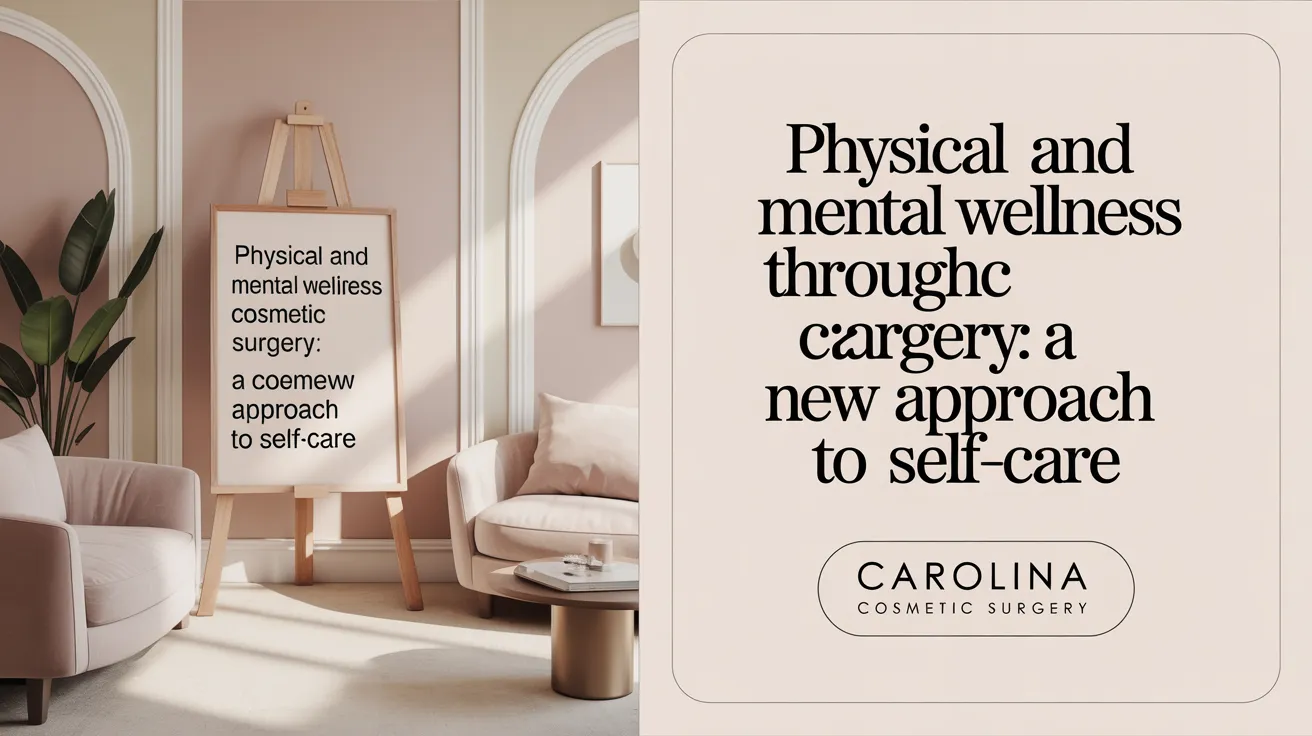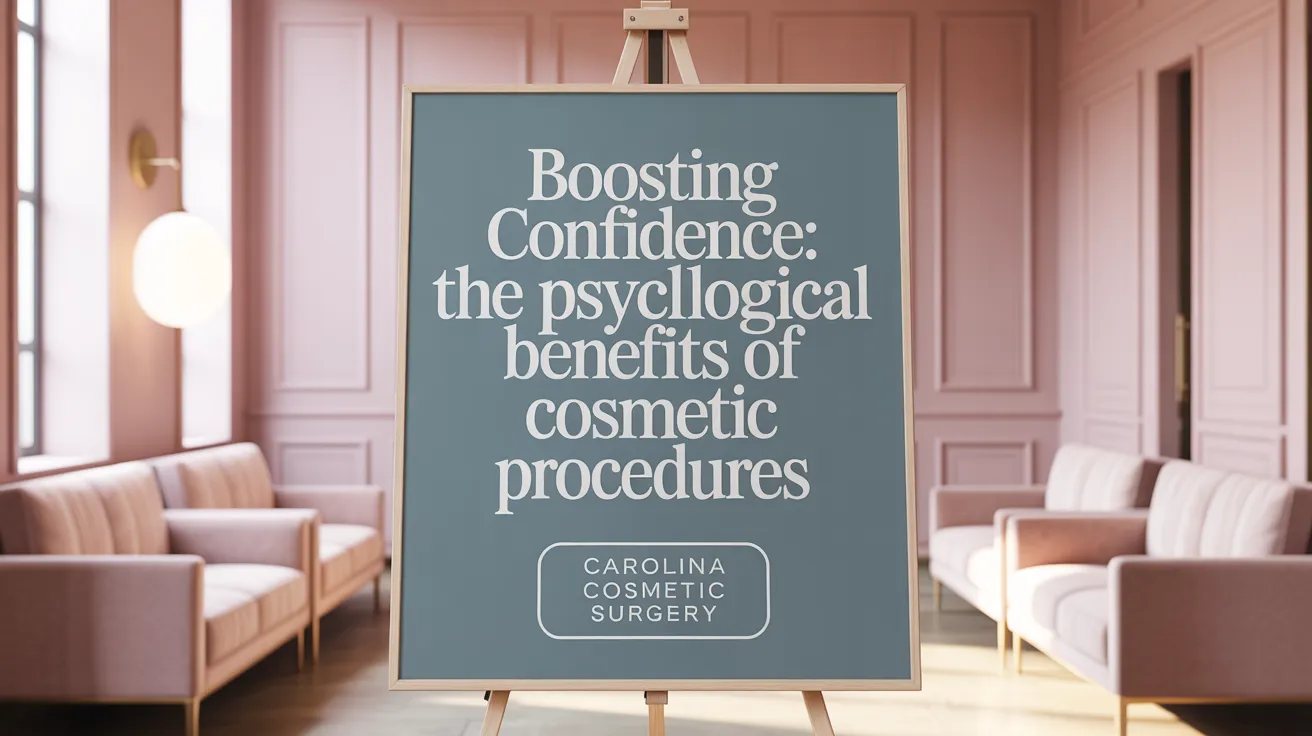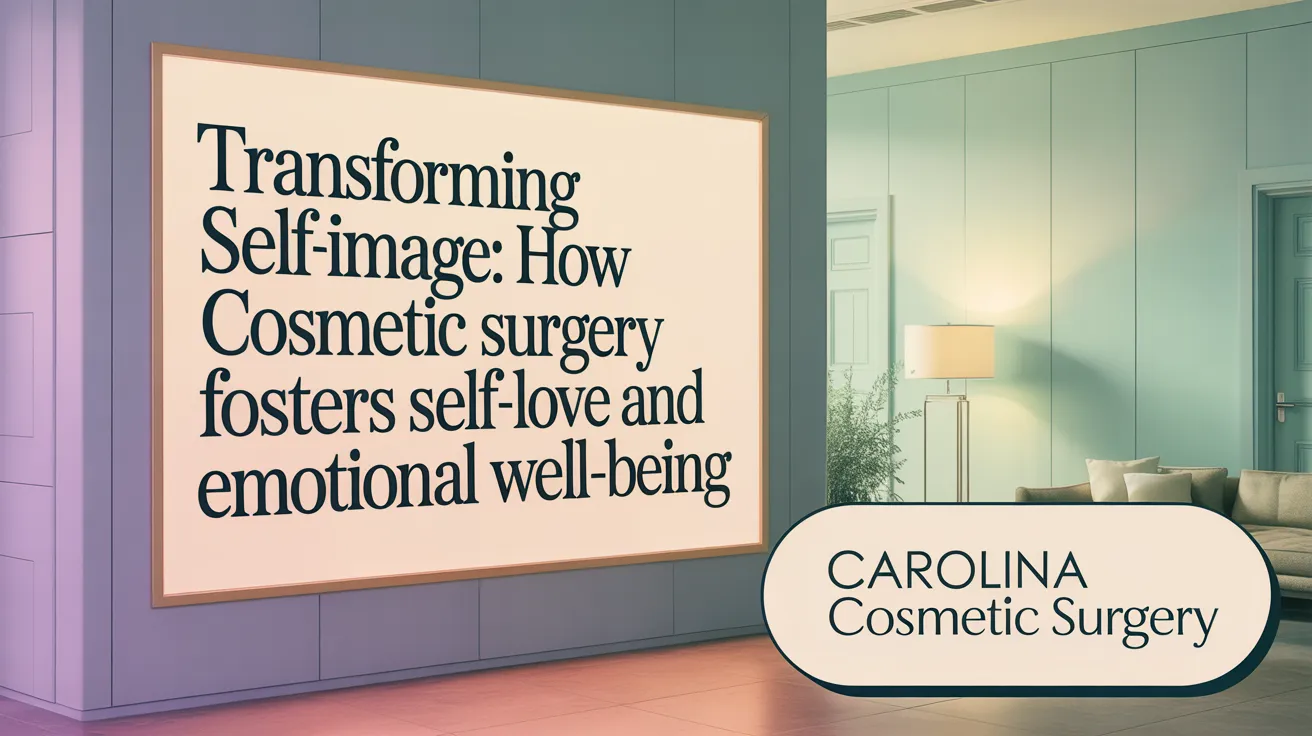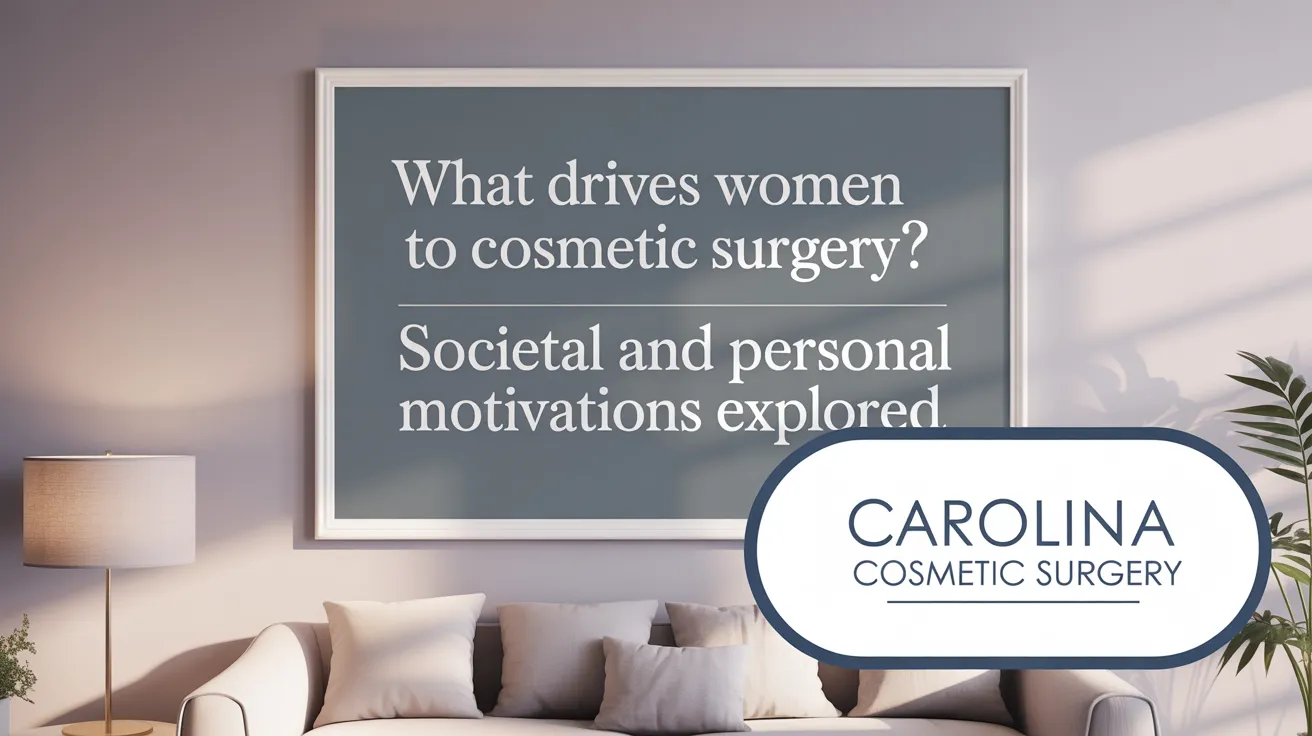Introduction to Cosmetic Surgery and Women's Self-Care
In recent years, cosmetic surgery has evolved beyond vanity or superficial desires, increasingly being viewed as a form of self-care among women. This shift recognizes the complex relationship between aesthetic procedures and women's psychological and emotional well-being. As more women in their 20s and 30s pursue surgeries ranging from breast augmentation to tummy tucks, understanding how these interventions influence self-esteem, body image, and overall wellness becomes essential. This article delves into the intersection of cosmetic surgery and self-care, examining motivations, psychological impacts, cultural influences, and the balance between benefits and risks to provide an informed perspective on this growing trend.
<!-- VIDEO:eyJsaW5rIjoiaHR0cHM6Ly93d3cueW91dHViZS5jb20vd2F0Y2g/dj1nLTUtYWI2RmZHTSIsImltYWdlVXJsIjoiaHR0cHM6Ly9lbmNyeXB0ZWQtdnRibjAuZ3N0YXRpYy5jb20vdmlkZW8/cT10Ym46QU5kOUdjUUdDS2x6QkNEV3JxdnNhTUF6MUNDME1ZUkZyVTN3Q1JjaHBnIiwidGl0bGUiOiJUaGUgUHN5Y2hvbG9naWNhbCBJbXBhY3RzIG9mIFBsYXN0aWMgU3VyZ2VyeSAtLSBBIEpvdXJuZXkgdG8gLi4uIiwic25pcHBldCI6IkluIHRoaXMgZW1wb3dlcmluZyBlcGlzb2RlIG9mIFBsYXN0aWMgU3VyZ2VyeSBVbmNlbnNvcmVkLCBEci4gUmFkeSBSYWhiYW4gYW5kIEFsZXhpcyBkaXZlIGRlZXAgaW50byB0aGUgdHJhbnNmb3JtYXRpdmUgaW1wYWN0IG9mIHBsYXN0aWPCoC4uLiJ9 -->Understanding Cosmetic Surgery as a Form of Women's Self-Care

What is the relationship between cosmetic surgery and women's self-care?
Cosmetic surgery has become an increasingly accepted way for women to practice self-care, blending physical and mental well-being. Many women view these procedures as a means to enhance their body image, boost self-esteem, and foster emotional resilience. Rather than vanity, these surgeries are often considered proactive steps towards self-improvement and self-love.
Research indicates that successful surgical outcomes can lead to reduced feelings of anxiety, depression, and dissatisfaction with one's appearance. For example, women who undergo procedures like breast reduction or lifts often report feeling more comfortable physically and more confident psychologically.
Media influence and societal standards reinforce the idea that taking care of oneself includes aesthetic enhancement. Social media platforms showcase idealized images, urging women to prioritize their appearance as part of their overall well-being. When approached with accurate expectations and through discussions with qualified surgeons, cosmetic surgery can significantly support women's self-care routines.
It is crucial, however, to distinguish between genuine self-care and superficial motives. Procedures should primarily serve to improve physical comfort and mental health, helping women feel more aligned with their own body image.
How cosmetic surgery enhances body image and self-esteem
Procedures such as tummy tucks, breast lifts, and calf augmentations are popular among women in their 20s and 30s, often performed to correct perceived flaws or age-related changes. Such interventions have been shown to elevate self-esteem; for instance, a study involving women undergoing breast augmentation revealed a 20% increase in self-esteem scores post-surgery.
Improving physical features can also translate into better social interactions, career confidence, and overall life satisfaction. Women frequently report that feeling good about their appearance makes them more active, optimistic, and willing to pursue opportunities.
Furthermore, procedures like body contouring address specific physical issues that lifestyle changes like diet and exercise might not resolve, helping women regain control and confidence in their bodies.
Role of realistic expectations and professional consultations
While cosmetic surgery can offer significant psychological benefits, setting proper expectations is vital. Women need to understand the realistic outcomes of their procedures. Overly high or unmanageable expectations can lead to disappointment, even when surgeries go well.
Consulting with qualified, experienced surgeons ensures women receive personalized advice tailored to their goals and physical conditions. Open communication during consultations empowers women to make informed decisions aligned with their self-care objectives.
Dr. Apesos emphasizes that honesty in discussing motivations and possible results helps ensure satisfaction and supports emotional health. Ultimately, cosmetic surgery should be viewed as an enhancement—an act of self-respect—rather than a means to meet external standards or societal pressures.
By combining realistic expectations with professional guidance, women can confidently pursue procedures that support their mental and physical well-being, reinforcing cosmetic surgery's role as a form of holistic self-care.
Psychological Impacts of Cosmetic Procedures on Mental Health and Self-Esteem

How do cosmetic procedures psychologically impact women's mental health and self-esteem?
Cosmetic surgery often brings about positive effects on women's mental health by boosting self-esteem and confidence. Many women who undergo procedures like breast augmentation, tummy tucks, or lifts report feeling better about their appearance, which helps improve their overall self-worth. This enhanced self-image can lead to a more active lifestyle and greater social engagement.
Research shows that most patients are satisfied with their surgical results, experiencing reductions in anxiety and depression. For example, a study involving women who had breast augmentation found a 20% increase in self-esteem scores post-surgery, highlighting its potential emotional benefits. These improvements contribute to a better quality of life and can empower women to pursue personal and professional goals.
However, the psychological impact varies among individuals. Women with pre-existing mental health issues such as body dysmorphic disorder, depression, or severe anxiety are at higher risk of dissatisfaction. Procedures may sometimes intensify body image concerns if expectations are not realistic. For instance, some may believe that cosmetic surgery will resolve underlying self-esteem problems, but superficial changes do not address deeper emotional issues.
Thus, it’s crucial that women approach cosmetic procedures with proper mental health assessments and realistic outlooks. Consulting qualified professionals and discussing motivations can help ensure the procedures serve as a positive step toward emotional well-being. When paired with appropriate psychological support, cosmetic surgery can support women in feeling more confident and fulfilled.
Influence of Cosmetic Surgery on Women's Self-Image, Self-Love, and Emotional Well-Being

How does cosmetic surgery influence women's self-image, self-love, and emotional well-being?
Cosmetic surgery often plays a significant role in shaping women's perceptions of their appearance and confidence. Many women seek procedures like breast reduction, lifts, or body contouring to align their external look with their personal ideals, which can lessen feelings of body dissatisfaction.
Research shows that improvements in appearance through surgery can lead to increased self-esteem and emotional satisfaction. Women frequently report feeling more confident, happier with their bodies, and better equipped to handle social situations after their procedures. For example, a study involving women undergoing breast augmentation found a 20% increase in self-esteem scores post-operation.
These positive effects extend to overall quality of life, as enhanced self-image can reduce symptoms of anxiety and depression. Women who undergo cosmetic procedures often describe feeling more attractive, desirable, and comfortable in their skin, which fosters greater self-love.
However, the emotional outcomes depend heavily on individual expectations and mental health. Women with realistic goals and good psychological readiness tend to experience more favorable long-term results. Conversely, those with unrealistic expectations or underlying mental health concerns might face dissatisfaction or emotional distress.
Cultural and social influences, such as media portrayal of beauty standards and social media trends, can intensify dissatisfaction, motivating women to pursue aesthetic procedures. While short-term psychosocial boosts are common, current evidence suggests that sustained emotional well-being after surgery requires proper management of expectations and ongoing psychological support.
In summary, cosmetic surgery can support women's mental health and self-confidence when approached thoughtfully. When combined with realistic goals and psychological preparedness, it contributes positively to self-image and emotional wellness, although long-term effects should be considered carefully.
Social, Cultural, and Psychological Motivations Behind Women's Pursuit of Cosmetic Surgery

What social, cultural, and psychological factors motivate women to pursue cosmetic surgery?
Women’s decisions to undergo cosmetic procedures are shaped by a mix of societal, cultural, and personal influences. Societal beauty standards often idolize certain physical traits, setting a benchmark that many women feel pressured to meet. These standards are reinforced through media, celebrity culture, and social media platforms, which regularly portray digitally enhanced images of beauty as the norm.
Media consumption plays a significant role in shaping perceptions of attractiveness. Platforms like Instagram and Snapchat promote idealized and often unrealistic images, fostering body dissatisfaction and social appearance anxiety. Research shows that exposure to such images can elevate the desire for cosmetic procedures, with a notable percentage of young women feeling dissatisfied with their bodies and considering surgery to bridge the gap between their appearance and societal ideals.
Beyond external influences, internal psychological factors are equally powerful drivers. Low self-esteem, body image concerns, and fear of aging or rejection can motivate women to pursue aesthetic enhancements. For some, cosmetic surgery offers a way to reshape or affirm their identity, providing a sense of control and agency over their appearance.
Cultural norms also influence perceptions of beauty and acceptance of cosmetic procedures. In many societies, external appearance is linked to social acceptance and success. Peer influences and societal validation further normalize these practices, framing cosmetic surgery as an act of self-care or self-improvement.
Women are often more receptive to these influences compared to men, perceiving more benefits and being more accepting of aesthetic interventions. For some, surgery becomes an extension of self-love, aiming to improve confidence and overall well-being. However, the motivated pursuit of beauty driven by societal and media messages can sometimes lead to superficial modifications that do not address underlying self-esteem issues.
In summary, women’s pursuit of cosmetic surgery is driven by a complex web of societal pressures, cultural norms, media portrayals, and internal psychological motivations. Recognition of these factors highlights the importance of promoting healthy body images and informed decision-making in cosmetic procedures.
Evolving Trends and Attitudes: Cosmetic Surgery as Empowering Self-Care
How are trends and attitudes evolving regarding cosmetic surgery as a form of self-care?
Public perceptions of cosmetic surgery are shifting toward a more accepting and normalized view, especially among younger generations. Many now see these procedures not simply as vanity but as a way to enhance self-confidence and overall well-being. This change is particularly evident with Generation Z, who are embracing cosmetic enhancements as a means of self-expression and self-empowerment.
Social media platforms play a significant role in shaping these attitudes. Platforms like Instagram and TikTok constantly promote idealized beauty standards, often featuring digitally altered images of celebrities and influencers. These images set new beauty benchmarks, influencing many to consider cosmetic procedures to meet these standards.
However, this influence is a double-edged sword. While it fosters greater acceptance of procedures like Botox, fillers, and minimally invasive treatments, it also raises concerns about unrealistic expectations and body dissatisfaction. The portrayal of perfect, flawless images can lead individuals to compare themselves unfavorably, fueling insecurity and drive for surgical correction.
Ethical debates continue around marketing practices in the cosmetic industry. Critics argue that some advertisements may be misleading, exaggerating benefits while downplaying risks or promoting unattainable ideals. There is also heightened awareness about the importance of realistic expectations and seeking qualified professionals for procedures.
Cultural norms and celebrity influence further impact societal attitudes. When high-profile figures openly share their cosmetic surgery experiences, it normalizes these procedures and encourages more people to view self-care in terms of external enhancement.
In summary, the evolving perspective is one of greater acceptance blended with ongoing societal dialogue about body image, ethics, and mental health. As cosmetic surgery becomes increasingly integrated into mainstream self-care routines, emphasis on informed choices and authentic representations remains essential.
The Connection Between Body Image, Self-Perception, and Cosmetic Surgery: Research Insights
What does research reveal about the connection between body image, self-perception, and cosmetic surgery?
Research shows that how individuals perceive their bodies and their overall self-image are significant factors influencing their interest in cosmetic procedures. People who experience dissatisfaction with their physical appearance or have negative self-perceptions are more likely to consider surgery as a solution.
Social media platforms like Instagram and Snapchat strongly contribute to shaping beauty standards by promoting idealized, digitally enhanced images. This exposure can lead to increased body dissatisfaction, especially among young women and men. Studies indicate that around 70% of young adult women and 60% of men report dissatisfaction with their bodies, which often correlates with a desire for cosmetic interventions.
Cultural influences and celebrity role models further reinforce societal beauty norms, making cosmetic surgery seem like an accessible way to achieve these standards. However, while some individuals experience improved self-esteem and body image after procedures, others may continue to struggle with underlying psychological issues.
Conditions such as body dysmorphic disorder (BDD) highlight the importance of psychological assessment prior to surgery. BDD involves obsessive focus on perceived flaws and often requires mental health treatment rather than cosmetic intervention.
Studies reveal a nuanced relationship: improving physical appearance can boost confidence, but superficial changes do not necessarily resolve deeper self-esteem or emotional concerns. Thus, psychological support and realistic expectations are essential to ensure that aesthetic procedures lead to lasting positive outcomes.
Overall, the research emphasizes that perceptions of body image and self-worth are complex, and cosmetic surgery should be approached with careful psychological consideration. Ethical standards and mental health evaluations play crucial roles in supporting healthy self-perception and preventing dissatisfaction.
Balancing Benefits and Risks: Cosmetic Surgery's Role in Women's Confidence and Wellness
What are the benefits and risks associated with cosmetic surgery in the context of women's self-care?
Cosmetic surgery can bring many positive effects for women, especially in terms of improving self-esteem, confidence, and body image. These enhancements often translate into better mental health and a more satisfying overall life experience. Many women notice a boost in satisfaction with their appearance after procedures like breast augmentation, tummy tucks, or lifts. In addition, some surgeries provide physical relief, such as reducing pain from large breasts or correcting skin laxity.
However, these procedures also carry certain risks. Surgical complications may include infection, abnormal scarring, nerve damage, or slow healing. Rare but serious issues like blood clots or anesthesia reactions can occur. Choosing experienced, board-certified surgeons significantly reduces these risks. To maximize benefits, women should approach cosmetic surgery with realistic expectations and maintain open communication with their healthcare providers. It’s especially important for individuals with mental health concerns, such as Body Dysmorphic Disorder, to seek professional support before surgery, as cosmetic procedures are not cures for psychological issues.
How does cosmetic surgery impact women's confidence and overall wellness?
Many women experience notable psychological benefits from cosmetic surgery. Improvements in appearance often lead to increased self-confidence and higher self-esteem. Procedures like breast augmentation or body contouring can make women feel more attractive and comfortable in their bodies, which boosts social interactions and self-care activities.
Beyond appearance, cosmetic surgery can affect mental wellness positively when women are psychologically prepared and realistic about outcomes. Many report reduced social anxiety and depression, contributing to a better quality of life. However, for women with pre-existing mental health conditions like body dysmorphic disorder, surgery may not resolve underlying issues and could sometimes worsen dissatisfaction.
While short-term improvements in confidence are widely documented, long-term mental health benefits show mixed results, with some studies indicating that mental health can decline years after surgery if expectations aren’t met or underlying problems persist. Overall, with appropriate psychological assessment and support, cosmetic surgery can serve as a beneficial tool that enhances women’s confidence and well-being.
Conclusion: Navigating Cosmetic Surgery as Part of Holistic Women's Self-Care
Cosmetic surgery represents a complex yet increasingly embraced facet of women's self-care, intersecting physical transformation with psychological and emotional growth. When approached with realistic expectations, professional guidance, and self-compassion, these procedures can support enhanced self-esteem, confidence, and overall wellness. However, societal influences, media portrayals, and personal insecurities underscore the need for careful psychological evaluation to avoid pitfalls such as body dissatisfaction and unmet emotional needs. Ultimately, cosmetic surgery may contribute to a woman's sense of agency and self-love when integrated thoughtfully within broader self-care practices, emphasizing that true empowerment comes from aligning external appearance with internal well-being.
References
- Inner beauty meets outer confidence
- Factors that motivate people to undergo cosmetic surgery
- Social Media Influence on Body Image and Cosmetic ...
- The Connection Between Positive Self-Image & Plastic ...
- Getting Work Done is Self Love, Find out Why!
- Cosmetic Surgery Can Boost Mental Health
- The Psychology Behind Cosmetic Surgery
- Exploring the Links Between Self-Compassion, Body ...
- Confidence Starts Here: How Plastic Surgery Supports ...
